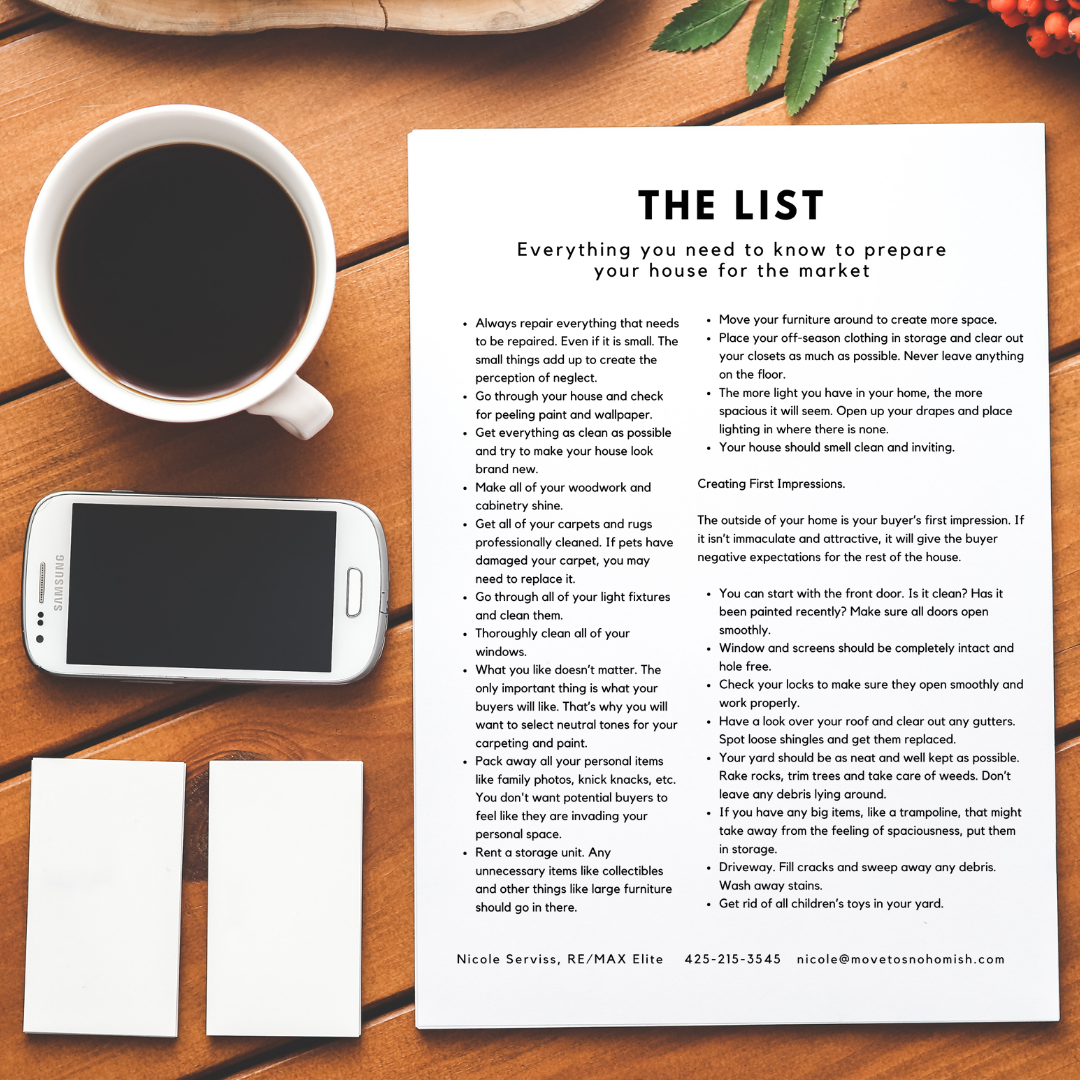
LEARN MORE ABOUT THE LOCAL MARKET.
Get My House Ready To Sell - The Ultimate Checklist
Get My House Ready To Sell
Everything you need to know to prepare your house for the market
Nicole Serviss, RE/MAX Elite
It’s a long list but if you do take the time to take care of your home, you will see the results.
Always repair everything that needs to be repaired. Even if it is small. The small things add up to create the perception of neglect.
Go through your house and check for peeling paint and wallpaper.
Get everything as clean as possible and try to make your house look brand new.
Make all of your woodwork and cabinetry shine.
Get all of your carpets and rugs professionally cleaned. If pets have damaged your carpet, you may need to replace it.
Go through all of your light fixtures and clean them.
Thoroughly clean all of your windows.
What you like doesn’t matter. The only important thing is what your buyers will like.
Select neutral tones for your carpeting and paint.
Pack away all your personal items like family photos, knick knacks, etc. You don't want potential buyers to feel like they are invading your personal space.
Rent a storage unit. Any unnecessary items like collectibles and other things like large furniture should go in there.
Move your furniture around to create more space.
Place your off-season clothing in storage and clear out your closets as much as possible. Never leave anything on the floor.
The more light you have in your home, the more spacious it will seem. Open up your drapes and place lighting in where there is none.
Your house should smell clean and inviting.
Creating First Impressions.
The outside of your home is your buyer’s first impression.
If it isn’t immaculate and attractive, it will give the buyer negative expectations for the rest of the house.
You can start with the front door. Is it clean? Has it been painted recently? Make sure all doors open smoothly.
Window and screens should be completely intact and hole free.
Check your locks to make sure they open smoothly and work properly.
Have a look over your roof and clear out any gutters. Spot loose shingles and get them replaced.
Your yard should be as neat and well kept as possible.
Rake rocks, trim trees and take care of weeds. Don’t leave any debris lying around.
If you have any big items, like a trampoline, that might take away from the feeling of spaciousness, put them in storage.
Driveway. Fill cracks and sweep away any debris. Wash away stains.
Get rid of all children’s toys in your yard.
Let's head inside.
If you have a closet in your entryway, make sure it is extra roomy. Remove any out of season clothing and put it in storage.
Decorate your mantle with something colorful, attractive, and simple. Less is more here.
Get rid of extra furniture and create more space. If a piece of furniture impedes your motion through or a room or makes it feel cramped, you need to put it in storage.
Make sure there are no burnt out bulbs!
Clear out your fireplace. Keep it neat and well swept.
Dining table. If you use extra chairs for your guests, put them in storage. If your table has extra leaves, remove them.
Clear the counters.
If your prospective buyers see a lot of unnecessary kitchen tools, they might get the idea that your kitchen isn’t spacious enough. Put everything you don’t use all the time into storage.
Everything should be immaculate and shiny. This is especially important for appliances.
Clear any clutter from the top of your refrigerator.
Hide your trashcan under your sink or put it in the garage during showings.
Keep all of your storage areas organized.
Make sure your washer and dryer are absolutely spotless and sparkling clean.
Laundry Room. Clear away any unnecessary items and dirty clothes.
Double check your stairway railings to be extra certain they are tight and secure.
Change the sheets on your bed to the nicest ones you can find.
Get your kids to go through all of their things and throw away old toys they don’t use.
Every closet should be properly lit.
Open up your closets by getting rid of extra clothing.
Put every questionable wall hanging or poster into storage until your house is sold. Anything too strange will distract your buyers.
Bathrooms must be extra clean and have no questionable smells.
Replace all of your worn out shower curtains.
Repair bathtub and shower caulking.
Repair leaky faucets and clear away any calcium, lime, or rust deposits wherever you see them.
Put away your personal products after every use.
Organize all of your cabinets and storage areas. Remove old products that you don’t use anymore.
Increase the space in your garage by organizing everything. Remove unnecessary tools or toys, and put them into storage.
Remove all cars from the garage before each showing. A garage without cars always looks bigger.
Make sure you garage door opener works and that the garage door closes properly. If not, hire a professional to repair it.
It’s all work that is worth it!
Reach out with questions!
You might be interested in…
What to Check For on a Final Walkthrough
When you purchase a home, you have the option to walk through it one more time right before it becomes officially yours. Here are some things to look out for so that you make sure you are getting the house in the condition you expected.
What to Check For on a Final Walkthrough
Nicole Serviss, RE/MAX Elite
First of all, what is a final walkthrough? When you purchase a home, you have the option to walk through it one more time right before it becomes officially yours. You get to check on the items the seller promised to fix in the home inspection and make sure the home is in the same condition you first saw it in.
There is a lot to look for so I put together a handy list to use when you do. Here are some things to look out for so that you make sure you are getting the house in the condition you expected.
If you have any questions, don’t hesitate to reach out here.
The List
Printable Version (click here)
Test all the lights.
Flip every light switch on and off to make sure there are no electrical issues.
Check the garage.
Test the doors. Make sure the safety auto reverse feature works.
Test the heating and air.
This is a costly replacement if functionality is lacking.
Test out the garbage disposal and all exhaust fans.
Check the fans on the stove and in the bathrooms/laundry room.
Look closely at the appliances.
Make sure the oven and stove work and double check the ice maker on the fridge is functioning.
Open and close windows.
Make sure they open and close properly and that locks are working.
Take note of cleanliness.
Check for trash or debris left behind and if carpets have been professionally cleaned.
Inspect walls, ceilings, and floors.
Make sure no holes have been made in the walls with the move.
Test all outlets.
Check the circuit breaker if there are any issues.
Check the plumbing.
Run all sinks, showers, and bathtubs. Flush all the toilets. Check for leaks.
Check the pipes.
Look for leaks or cracks around all visible piping.
Check the doors.
Pay attention to all knobs and locks. Also, check the doorbell.
16 Questions to Ask a Lender
Loan terms, rates and products can vary significantly from one lending company to the next. Plus, how do you handle closings in the age of COVID-19?
16 Questions to Ask a Lender
Nicole Serviss, RE/MAX Elite
If you have any questions, don’t hesitate to reach out here.
What are the most popular mortgages you offer? Why are they so popular?
Are your rates, terms, fees and closing costs negotiable?
Do you offer discounts for inspections, homeownership classes or automatic payment set-up?
Will I have to buy private mortgage insurance? If so, how much will it cost and how long will it be required?
What escrow requirements do you have?
What kind of bill-pay options do you offer?
Do you do remote closings?
Explain the process of closing with social distancing.
What would be included in my mortgage payment (homeowners insurance, property taxes, etc.)?
Which type of mortgage plan would you recommend for my situation?
Who will service this loan? Your bank or another company?
How long will the rate on this loan be locked-in? Will I be able to obtain a lower rate if the market rate drops during the lock-in period?
How long will the loan approval process take?
How long will it take to close the loan?
Are there any charges or penalties for prepaying this loan?
How much will I be paying in total over the life of this loan?
You might be interested in…
85 Things Not To Neglect When Selling Your House FSBO (For Sale By Owner)
The best way to sell your house is to sell it fast. When your house isn’t in the best condition, the appearance isn't great or if it isn't priced right, it sits on the market for far too long and becomes stale. That’s when people begin to wonder what’s wrong with it...
85 Things Not to Neglect When Selling Your House
Nicole Serviss, RE/MAX Elite
When you put your home on the market, it needs to be immaculate. It needs to have all of the positive aspects that attract buyers. These days, it simply isn’t enough to just take care of basic repairs and cleaning. Your home needs to be presented in a light that gets buyers to imagine all the possibilities. You need to make them dream.
Take care of every little repair and do whatever is in your power to make your home desirable on the first day you show it, not the last. Your home must be clean, neutral, and spacious.
Every room needs to be “staged,” with lighting and arrangements that show off its features. If you miss any of these steps, you risk losing that potential buyer. And once you lose that chance at a great first impression, you might lose any chance of selling it for a decent price.
It’s a long list but if you do take the time to take care of your home, you will see the results.
This list works great for those of you thinking of selling your home FSBO (For Sale By Owner). If you have any questions, don’t hesitate to reach out here.
You might be interested in…
Interviewing A Management Company
If you decide to hire a property manager, it's a good idea to visit the management company's office and interview the prospective property manager.
Interviewing A Management Company
Nicole Serviss, RE/MAX Elite
If you decide to hire a property manager, it's a good idea to visit the management company's office and interview the prospective property manager.
Questions to ask include:
How many years of experience do you have?
What management services do you provide? Can I have that in writing?
How do you structure your fees?
Are there fees when the property is vacant?
How do you screen tenants?
What kind of insurance coverage do you have?
Are employees bonded?
How are funds for different properties handled?
Is there a single account for all properties or an individual account for each?
How do you stay current on local, state, and federal laws?
How often do you communicate with clients and how do you present reports?
How quickly do you get properties on the market?
What are your average vacancy rates?
You might be interested in…
Types of Property Ownership
Learn that pros and cons of the different types of property ownership.
Types of Property Ownership
Nicole Serviss, RE/MAX Elite
Sole Proprietorship
A sole proprietorship is a business owned and run by an individual or spouses. The owners receive the net income as ordinary income, which is taxed at the owner’s personal rate. Simplicity is its main advantage as organizing as a sole proprietorship requires no legal setup, no extra tax reporting, and no additional partners. Its main disadvantage is unlimited liability. Sole proprietorships do not provide any asset protection. In the case of a lawsuit, all of the owner’s personal assets are all at risk.
General Partnership
A general partnership is similar to a sole proprietorship in that each of the individual owners is liable for income taxes on his or her share of the business income. Partners are also personally liable for the actions and debts of the partnership. The partnership terminates upon the death, disability, or withdrawal of any one partner. However, most partnership agreements anticipate these types of events; by prior agreement, the remaining partners purchase the departing partner’s share.
Limited Partnership
A limited partnership is structured around a general partner and limited partners, who invest in the enterprise. The general partner has management control and is responsible for all business actions and debts. The limited partners, who contribute capital and have little involvement in day-to-day operations, are not liable for any debts. The advantage for the general partner is access to a pool of capital. The limited partners receive a stream of profits and losses without any of the work of property management.
Limited Liability Company (LLC)
Limited liability companies have the advantage of providing asset protection but at the same time avoiding the double taxation that comes with a C corporation. LLCs also limit the owner’s liability to the extent of their investments. They are also easier to set up than corporations, and do not require shareholders or annual meetings. LLCs can have multiple owners (called members), and the members can be individuals or partnerships, trusts, foreign investors, or corporations, each owning different percentages. Most states permit single-member LLCs (although there may be tax consequences for these), but spouses are considered two members when forming an LLC.
The LLC is a pass-through entity that helps the owners avoid paying both corporate and personal taxes. The owner of a one-member LLC does not need to file a separate tax return for the business entity. All of the income and expenses, which are deductible, are reported on the LLC operator’s tax return. On the downside, the single-owner is required to pay self-employment tax on income generated. The challenge for single- owner LLCs is to keep a strict separation between the business entity and the owner’s personal and other business affairs.
S Corporation
The S corporation is a pass-through entity that offers the benefit of limiting the liability of the owners. Owners pay personal income tax on corporate profits, while the corporation reports those taxes under its own corporate tax returns. Owners pay taxes on their salaries, bonuses, and dividends as well as retained earnings. As a separate structure, S corporations require scheduled director and shareholder meetings, minutes from those meetings, adoption and updates to by-laws, stock transfers, and records maintenance.
S corporation owners are compensated by paying themselves a salary. Excess profits can be distributed as dividends. The S corporation, however, has limited utility as an ownership entity for investment real estate because no more than 25 percent of gross receipts can come from passive activity.
C Corporation
The C Corporation is an independent legal entity owned by the shareholders and is treated as a separate entity for tax purposes. It is separate from those who own, control, and manage it, therefore the corporation itself, not the shareholders that own it, is held legally liable for the actions and debts the business incurs.
The C Corporation pays corporate tax, and the owners pay personal income tax only on their salaries, bonuses, and dividends. The C Corporation not only has the disadvantage of double taxation, it is also more costly and time-consuming to set-up and operate, and requires additional record keeping.






















Not all of Snohomish County’s best neighborhoods get the attention they deserve. Take a closer look at the hidden gems buyers and homeowners are starting to notice.